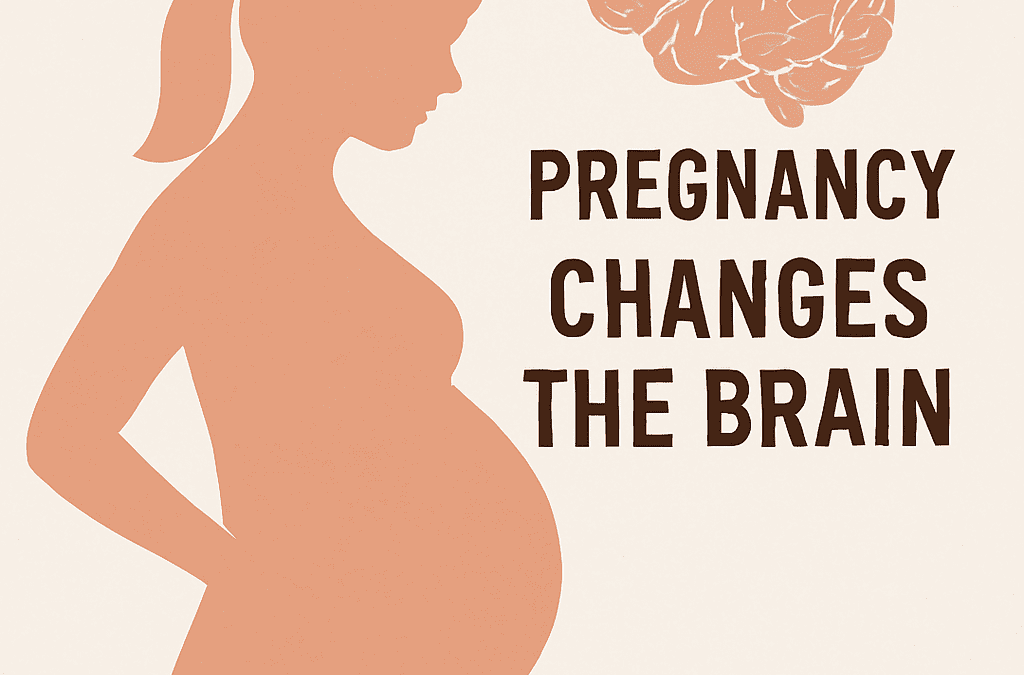By: Daisy S. Vergara, LMHC
Yes, It’s True—Pregnancy Changes the Brain
Pregnancy changes the brain in powerful and lasting ways. It’s more than just hormones; brain imaging shows real neurological shifts that support bonding, empathy, and caregiving.
Let’s explore how these changes show up, what they mean, and why understanding them matters for your mental health and your parenting journey.
How Pregnancy Changes the Brain for Bonding and Connection
One of the most well-known studies on this topic was published in Nature Neuroscience. Researchers discovered that pregnancy leads to significant changes in brain structure—specifically, a reduction in gray matter in regions involved in social cognition, empathy, and attachment.
These areas help us tune into others’ emotions and needs, and the changes may support new parents in bonding with and responding to their baby. Even more fascinating? These effects were shown to last for at least two years postpartum.
Wait… Why Do I Like Eggs Now? (Or Hate Seafood)
Pregnancy doesn’t just affect your emotions—it can change your senses, food cravings, and even your likes and dislikes. For example, I never liked eggs before pregnancy, but I suddenly craved them—and still enjoy them now. A close friend of mine loved seafood before getting pregnant, but now she can’t stand the smell.
These sensory changes aren’t random. Research shows that hormonal shifts—especially in estrogen and progesterone—can influence taste and smell receptors. Experts believe this may be the body’s way of protecting the pregnancy and meeting specific nutritional needs during this new stage of life.
The Truth About “Mom Brain”
Have you ever felt more forgetful or mentally foggy during pregnancy or postpartum? You’re not alone—and you’re not imagining it.
What many people call “mom brain” or “pregnancy brain” might partly be due to sleep deprivation and emotional overload, but that’s not the whole story. Brain science suggests your brain is also reprioritizing.
Functional MRI studies show increased activity in brain areas linked to emotional processing, empathy, and caregiving—especially in response to infant cues. So, it’s not that you’re losing focus. Your brain is making space for what matters most: connection, bonding, and care.
Pregnancy Is a Whole-Mind Experience
At Ohana Behavioral Health, we believe that pregnancy is a transformation of the whole self—not just the body, but also the brain and heart.
If you’re feeling more emotional, noticing new preferences, or just sensing that you’re different—know that you’re not “overreacting” or being dramatic. These changes are real, powerful, and rooted in biology. Your brain is preparing you for the transition to parenthood in beautifully complex ways.
Why April Is the Perfect Time to Prioritize Mental Health in Pregnancy
April is both Stress Awareness Month and Counseling Awareness Month, making it the perfect time to reflect on how pregnancy impacts your mental health.
Let’s be honest—pregnancy can be stressful. The physical changes, the emotional rollercoasters, the anticipation of birth… It’s a lot. Even with the brain’s incredible adaptations, you don’t have to navigate it all on your own.
Therapy during pregnancy can help you:
Manage stress and emotional ups and downs
Understand the mental and neurological changes you’re experiencing
Feel more supported and empowered during this transition
Your mental health deserves just as much care as your physical health. At Ohana, we’re here to support you with compassion, evidence-based care, and deep respect for your lived experience.
Ready to talk?
Whether you’re pregnant, postpartum, or supporting someone who is, we’re here for you. Contact us to schedule a session or learn more about perinatal and infant mental health support at Ohana Behavioral Health.



